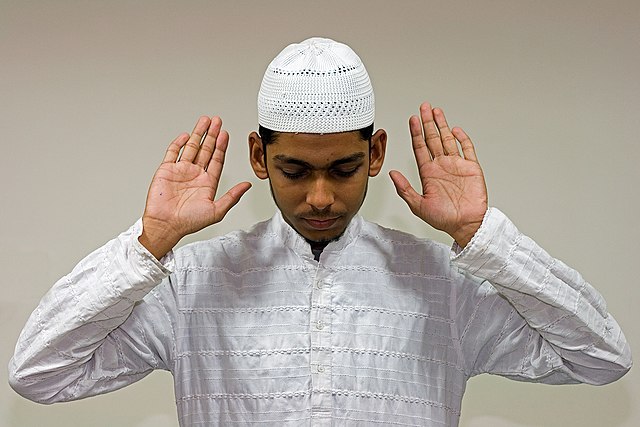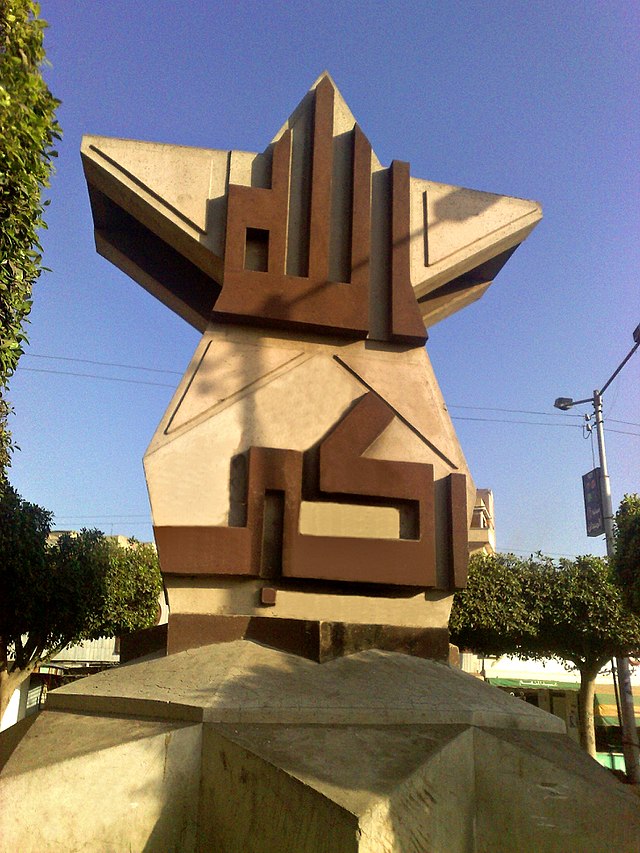Takbir
Arabic phrase "ʾAllāhu ʾakbar", meaning "God is the greatest" From Wikipedia, the free encyclopedia
The takbīr (Arabic: تَكْبِير, pronounced [tak.biːr], lit. 'magnification [of God]') is the name for the Arabic phrase Allāhu ʾakbar (Arabic: اَللَّٰهُ أَكْبَرُ, pronounced [ʔaɫ.ɫaː.hu ʔak.bar] ⓘ, lit. 'Allah is greater than everything').[1][2][3][4]
| Takbir | |
| Arabic | تَكْبِير |
|---|---|
| Romanization | takbīr |
| IPA | Arabic pronunciation: [tak.biːr] |
| Literal meaning | "magnification [of God]" |
| Allahu Akbar | |
| Arabic | اَللَّٰهُ أَكْبَرُ |
|---|---|
| Romanization | Allāhu ʾakbar |
| IPA | [ʔaɫ.ɫaː.hu ʔak.bar] ⓘ |
| Literal meaning | "God is the greatest [than everything]" |
It is a common Arabic expression, used in various contexts by Muslims and Arabs around the world: in formal salah (prayer),[4] in the adhan (Islamic call to prayer),[5] in Hajj, as an informal expression of faith, in times of distress or joy, or to express resolute determination or defiance. The phrase is the official motto of Iran and Iraq. It is also used by Orthodox Arab Christians as an expression of faith.[6]
Etymology

The Arabic word كَبِير (kabīr) means big from the Semitic root k-b-r. A cognate word for this root exists in Hebrew as כביר (kabir). The Arabic word أَكْبَر (ʾakbar) is the elative form ("bigger, biggest") of the adjective kabīr ("big"). When used in the takbīr it is usually translated as "biggest", but some authors translate it as "bigger".[7][8][9] The term takbīr itself is the stem II verbal noun of the root k-b-r, meaning "big", from which akbar "bigger" is derived. The form Allāhu is a nominative of Allah, meaning "God".[10][11]
The takbīr is sometimes translated into English as "God is greater", which is short for "God is greater than all" (الله أَكْبَرُ من كلِّ شيء). It is an example of an Arabic idiom where an incomplete sentence, abbreviated because of its familiarity, is considered grammatically correct.[12]
Usage in Islamic rituals


This phrase is recited by Muslims in many different situations.
In prayer
The phrase is said during each stage of both salah (obligatory prayers, performed five times a day), and nafl (supererogatory prayers, performed at will). The call to prayer by the muezzin to those outside the mosque (adhan) and the call to those inside to line up for the commencement of prayer (iqama) also contain the phrase.[5]
While there are many short prayers like it, the takbīr is used more frequently than any other.[13]
Following births and deaths
The phrase is used after the birth of a child as a means of praising God.[14] It is also part of Islamic funeral and burial customs.[15]
During the Eid Festival and the Hajj
During the festival of Eid al-Adha and the days preceding it, Muslims recite the takbīr. This is particularly the case on the Day of Arafah.[16]
During the halal slaughter of animals
In the process of pronouncing the name of God while performing Dhabihah one must say Bismillah Allahu Akbar.[17]
Other social usage
Summarize
Perspective



The expression Allāhu ʾakbar can be used in a variety of situations, from celebrations to times of grief.
In a historical account by someone who was present both at the birth of the ruler Abd Allah ibn al-Zubayr (7th century) and at his funeral, the author observes that Allāhu ʾakbar was said on both occasions.[18]
In times of joy and gratitude
The takbīr can be used to express joy or surprise. It is also used as applause in religious contexts, such as after a Quran recital, as other forms of applause are considered less appropriate.[19]
It is used to celebrate an election win.[20][21] As a multi-purpose phrase, it is sometimes used by Arab football commentators as an expression of amazement, or even as a football chant.[22]
In battle
Historically, the takbīr has been used as a cry of victory during battle.[23] Ibn Ishaq's 8th century Life of Muhammed narrates two occasions when Muhammad proclaimed the takbīr during battle.[24]
Iran
During the Iranian Revolution of 1979, it was shouted from rooftops in Iran during the evenings as a form of protest. The takbīr was later adopted as the official motto of Iran.[25] This practice returned in the 2009 Iranian presidential election protests,[26][27] which protested the election results.[28]
Usage by extremists and terrorists
The phrase has been used as a battle cry by Islamic extremists and terrorists.[29] However, this usage has been denounced by other Muslims.[18][22]
Professor Khaled A. Beydoun, author of The New Crusades: Islamophobia and the Global War on Muslims (2023),[30] writes that the association of the phrase "Allah Akbar" with terrorism has been exacerbated by mass media and television pundits. He adds that films and shows also utilize it as a cinematic trope further cementing the association.[31]
In politics
In India, Asaduddin Owaisi, president of the AIMIM and Abu Taher Khan, representing TMC, after being elected as members of the Indian Parliament, ended their oath with the slogan of "Allahu Akbar".[32]
Usage by Christians
The phrase (Allah; meaning God in English) is only used by Arab Christians in third person view, and is rarely mentioned during prayers or church service.[citation needed] The Palestinian Christians use Allah in their prayer to refer to the creator of the world, and the takbir as an expression of their faith. The use of takbir has been defended by Theodosios Hanna, the Palestinian Orthodox Archbishop of Sebastia.[33]
Use on flags
Summarize
Perspective
Afghanistan
The Afghan constitution that came into force on January 4, 2004, required that Allāhu akbar be inscribed on the flag of the Islamic Republic of Afghanistan.[34] After the 2021 Taliban offensive, the flag of the first emirate was readopted, and thus the takbīr removed from the flag.[35]
Iran
Allāhu akbar is written in stylized form across the bottom of the green stripe and the top of the red stripe of the flag of the Islamic Republic of Iran, adopted in 1980.[36]
Iraq
The phrase Allāhu akbar is written on the center of the flag of Iraq.
During the Gulf War in January 1991, Saddam Hussein held a meeting with top military commanders, where it was decided to add the words Allāhu akbar (described as the Islamic battle cry)[37] to Iraq's flag to boost his secular regime's religious credentials, casting himself as the leader of an Islamic army.[38][39] Hussein described the flag as "the banner of jihad and monotheism".[40]
In 2004, the US-picked Iraqi Governing Council approved a new flag for Iraq that abandoned symbols of Hussein's regime, such as the words Allāhu akbar.[38][41] In January 2008, however, Iraq's parliament passed a law to change the flag by leaving in the phrase, but changing the calligraphy of the words Allāhu akbar, which had been a copy of Hussein's handwriting, to a Kufic script.[42][43] The Iraqi flag under Hussein had each of the two words of the phrase written in one of the spaces between the stars on the central band; the flag adopted in 2008 decided to leave the phrase in, removes the stars.
Other uses
A resistance movement that fought British rule in Waziristan, Pakistan, used a red flag bearing Allāhu akbar in white letters.[44]
The flag used by the Houthis in Yemen also includes bearing Allāhu akbar in green letters.[45]
- Flag of Iraq, with stylized Kufic script, introduced in 2008
- Flag of Iran, introduced in 1980
- Former flag of Afghanistan, with the phrase beneath the Shahada, used from 2004 to 2021
- Flag of 1930s Waziristan (Pakistan) resistance movement
See also
References
External links
Wikiwand - on
Seamless Wikipedia browsing. On steroids.



